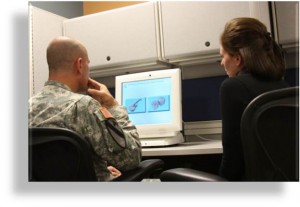Retooling cognitive rehabilitation for patients with traumatic brain injury
September 24, 2012//Comments Off on Retooling cognitive rehabilitation for patients with traumatic brain injury
 Our colleague Kate Sullivan, who led a superb SharpBrains Virtual Summit workshop on How to Set Up a Brain Fitness Center to Enhance Cognitive Retraining and Rehabilitation, based on her experience at Walter Reed National Military Medical Center, just alerted us of a new study prepared by her team: Outcomes from a Pilot Study using Computer-Based Rehabilitative Tools in a Military Population (Studies in Health Technology and Informatics).
Our colleague Kate Sullivan, who led a superb SharpBrains Virtual Summit workshop on How to Set Up a Brain Fitness Center to Enhance Cognitive Retraining and Rehabilitation, based on her experience at Walter Reed National Military Medical Center, just alerted us of a new study prepared by her team: Outcomes from a Pilot Study using Computer-Based Rehabilitative Tools in a Military Population (Studies in Health Technology and Informatics).
- Abstract: Novel therapeutic approaches and outcome data are needed for cognitive rehabilitation for patients with a traumatic brain injury; computer-based programs may play a critical role in filling existing knowledge gaps. Brain-fitness computer programs can complement existing therapies, maximize neuroplasticity, provide treatment beyond the clinic, and deliver objective efficacy data. However, these approaches have not been extensively studied in the military and traumatic brain injury population. Walter Reed National Military Medical Center established its Brain Fitness Center (BFC) in 2008 as an adjunct to traditional cognitive therapies for wounded warriors. The BFC offers commercially available “brain-training” products for military Service Members to use in a supportive, structured environment. Over 250 Service Members have utilized this therapeutic intervention. Each patient receives subjective assessments pre and post BFC participation including the Mayo-Portland Adaptability Inventory‑4 (MPAI‑4), the Neurobehavioral Symptom Inventory (NBSI), and the Satisfaction with Life Scale (SWLS). A review of the first 29 BFC participants, who finished initial and repeat measures, was completed to determine the effectiveness of the BFC program. Two of the three questionnaires of self-reported symptom change completed before and after participation in the BFC revealed a statistically significant reduction in symptom severity based on MPAI and NBSI total scores (p < .05). There were no significant differences in the SWLS score. Despite the typical limitations of a retrospective chart review, such as variation in treatment procedures, preliminary results reveal a trend towards improved self-reported cognitive and functional symptoms.
To Learn More
- Study: Outcomes from a Pilot Study using Computer-Based Rehabilitative Tools in a Military Population (requires registration)
- Workshop: How to Set Up a Brain Fitness Center to Enhance Cognitive Retraining and Rehabilitation (requires registration)
Pic: courtesy of Kate Sulivan
Posted in Brain/ Mental Health, Technology & Innovation
About SharpBrains
SHARPBRAINS is an independent think-tank and consulting firm providing services at the frontier of applied neuroscience, health, leadership and innovation.
SHARPBRAINS es un think-tank y consultoría independiente proporcionando servicios para la neurociencia aplicada, salud, liderazgo e innovación.


